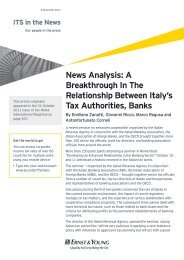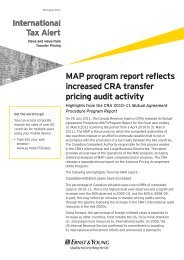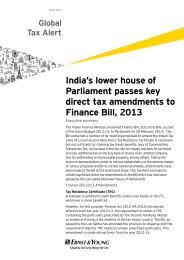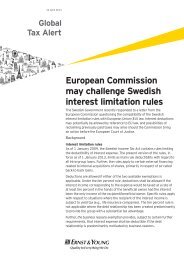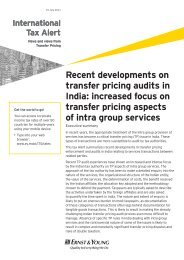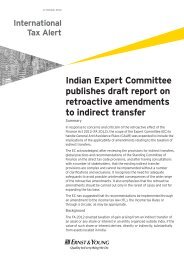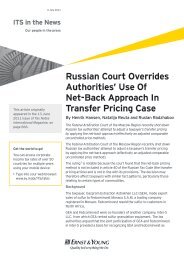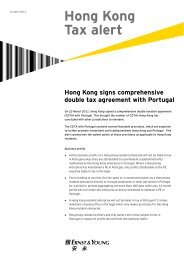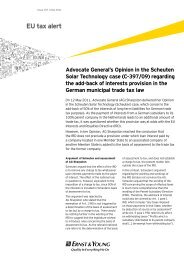(GST) compliance obligations (pdf, 5.62 MB) - Ernst & Young T ...
(GST) compliance obligations (pdf, 5.62 MB) - Ernst & Young T ...
(GST) compliance obligations (pdf, 5.62 MB) - Ernst & Young T ...
Create successful ePaper yourself
Turn your PDF publications into a flip-book with our unique Google optimized e-Paper software.
We found that in most cases there is little time for taxpayers to<br />
make VAT decisions related to their transactions. In just under<br />
two-thirds of countries surveyed (59), taxpayers must issue a<br />
VAT invoice on the same day that the transaction takes place.<br />
Even where taxpayers have some time after the transaction<br />
EU Commission viewpoint: VAT a “central plank” of fiscal policy<br />
Stephen Bill, Advisor to the Director General for Taxation<br />
in the European Commission talking at the <strong>Ernst</strong> & <strong>Young</strong><br />
2010 Indirect Tax Symposium in Budapest, discussed the<br />
importance of VAT as a source of revenue as countries<br />
recover from the economic downturn:<br />
“VAT is likely to play a key role in the fiscal ‘exit’ strategies<br />
which many countries have been forced to adopt in the<br />
wake of the recent financial crisis. Many economists agree<br />
that a shift from personal and corporate income tax to<br />
consumption, property and environment taxes will help<br />
stimulate growth. In other words, greater reliance on VAT<br />
will contribute towards a better quality of revenue-raising<br />
by making tax systems more ‘growth friendly.’ I think<br />
economists have got it right on this, particularly if one<br />
takes into account that one of the deepest and most<br />
long-lasting socio-economic problems arising out of the<br />
crisis is growing unemployment. Even if governments do<br />
not follow a policy of tax shifting, VAT will still have a role<br />
to play by helping to raise the additional revenues many<br />
countries need to correct the massive fiscal imbalances<br />
which have built up over the last few years.”<br />
“Within the EU we have already seen several Member States<br />
raise their standard rate of VAT (the latest being Finland).<br />
Interestingly very few went down the road of cutting VAT<br />
to stimulate growth — notably the UK — but this was only a<br />
11 VAT and <strong>GST</strong>: multiple burdens for multinational companies<br />
to issue their invoices, in all but three countries we examined<br />
(Austria, Germany and Ivory Coast), the invoice is required<br />
within one calendar month.<br />
temporary measure and has now been reversed. I think we<br />
can safely conclude therefore that governments will indeed<br />
look to VAT as a source of extra revenue over the next few<br />
years. However, this does not of course have to be done by<br />
raising the standard rate. The other possibility is to curtail<br />
the scope of reduced rates and/or exemptions.”<br />
“Whether or not governments examine their reduced<br />
rates and exemptions, we can, I think, conclude that the<br />
maintenance of a healthy revenue stream from VAT will<br />
be a central plank in most governments’ fiscal policies for<br />
years to come. But how robust is the tax and how reliable is<br />
it likely to be in delivering this much needed revenue? The<br />
threats which tax administrations perceive, and the way<br />
they react, will go a long way in the coming years towards<br />
driving tax policy as regards to the mechanics of the<br />
system. In this context, I think two areas of perceived threat<br />
have, and will continue, to drive VAT policy. The first is the<br />
tax treatment of services capable of being delivered from<br />
a remote location. The second is the need to counteract<br />
fraud and evasion.”




